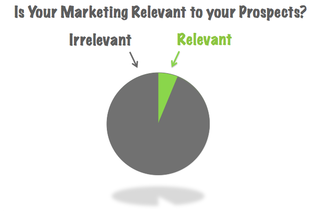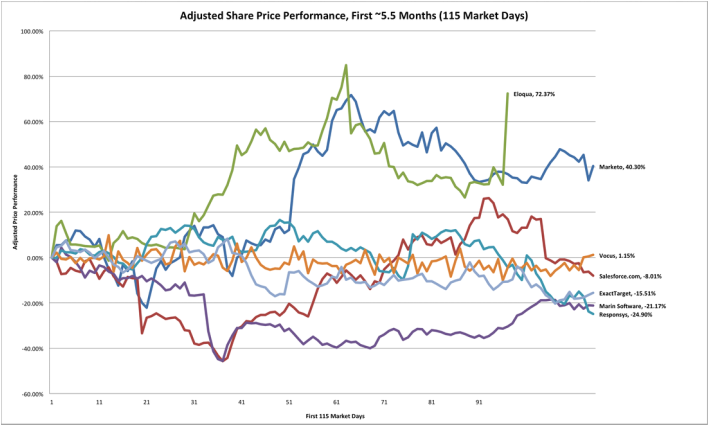
Here is a quick quiz to help you ask the right questions about your business as well as suggested marketing plans based on your answers:
Demand Generation Quiz: Which Model is right for your B2B Company
1. How big is your potential market?
A) Every company in the world could buy from us
B) More than ten thousand, but not unlimited
C) We can name every potential customer
2. How expensive is your product?
A) less than a couple of thousands
B) Tens of thousands
C) 7 figures plus
3. Do your potential customers know of you and know generally what you do?
A) Mostly, yes
B) ~10%-50% probably do
C) Nope, we need to work on that
4. Are your potential customers actively looking for solutions like yours?
A) Yes, the market is generally aware that companies provide solutions like ours
B) Mixed
C) No, we are creating a new market space
5. How many non-independently branded product families do you sell? (for example: Proctor & Gamble sells hundreds (thousands?) of products, but nearly all under a independently branded name brand. While Oracle also sells hundreds of products, but most are sold under the Oracle brand).
A) <5
B) 5-10
C) >10
6. Is your primary offering consulting services?
A) No
B) We sell services, but as an add on
C) Yes
7. How open minded are your potential customers to new ideas and technology?
A) Very open minded and are actively seeking emerging ideas and technology
B) Mixed
C) Our potential customers are risk adverse and/or traditionalist
8. How long is your total marketing to sales cycle?
A) Days
B) Months
C) Years
_______________________________________________________________
Results: How Did You Answer?
***Mostly A’s - A marketing led, sales assisted/closed approach is best
You have described a market in which a marketing driven, low touch, high velocity model will likely work best. Companies with attributes such as offering low cost, well known products to educated prospects who are actively seeking solutions, are well advised to focus resources on receiving and converting inbound interest, rather than less productive cold calling and outbound prospecting.
Creating an impactful and engaging prospect web experience is also considerably easier when companies have shorter sales cycles and can focus inbound marketing messaging around less than five products or services, rather than dozens or hundreds.
Recommended Channel Strategies For Your Market
- Organic Inbound Marketing
- Website - companies with few products, inexpensive products, and/or short sales cycles should create a conversion focused (obsessed!) website whose main goal is to drive visitors to clear call to actions (CTAs) with unconfusing messaging firmly rooted in the current nomenclature of the market. Brand positioning and artistic design is still important, but both should be seen as subservient to demand generation.
- SEO - while the core site should be optimized for the most important keywords, creating unique pages for the long tail is also important because as industries mature and grow, solutions for more specific use cases become key differentiators. The publishing of unique pages discussing specific use cases including verticals, features,and region-centric topics will be indexed by search engines and allow prospects to find your products via a broad range of relevant search terms.
- Social Media Discussions - Facebook, Twitter, LinkedIn are all omnipresent in today’s digital world. Companies are well advised to participate both as a brand and, for key thought leaders, as brand spokesmen, in conversations about their products and industry. Like any other organic channel however, prolonged and consistent investment and attention is necessary to produce demand generation results.
- Paid Inbound Marketing
- SEM - for companies in markets where prospects are actively seeking solutions like ones your company sells, a comprehensive SEM campaign portfolio covering topics from the early, mid and late stages of the buyer cycle often proves an effect method of capturing demand. It should be noted however, that SEM campaigns need to be actively managed to achieve ROI and continued success. If you do not have in house expertise in this area, consider contracting one of the many SEM consulting companies to manage your campaigns.
- Re-Targeting - when prospects don’t convert after the first visit, re-targeting can offer the opportunity to keep your brand front of mind, even if you don’t have an extensive sales team to do follow up calls.
- Social Media Campaigning - companies targeting an expansive market made up of technically savvy prospects should work to develop effective social media campaigns and offers which drive awareness and engagement with prospects. When it comes to achieving ROI in this channel, targeting is especially important and platforms like Twitter, Facebook and LinkedIn have new features that allow companies to target via demographic, firmographic, by account, or by individual.
- Outbound Marketing Strategy
- Tradeshows - the traditional approach to tradeshows, i.e. booth sponsorships, are typically not effective from a demand generation prospective. To get around this, be creative with event sponsorships and related programs. Consider pre-event promotions (i.e.: VIP your trip) to learn who is planning on attending, obtaining speaking sessions so you can present your story uninterrupted, hosting parties nearby the show, subletting other company’s sponsorships, and co-sponsoring with other companies.
- Email Marketing - outbound emailing purchased lists is relatively unproductive at scale due to the diminishing returns caused by spam filters, so instead companies with huge potential markets should focus on creating compelling cross channel marketing experiences for prospects that use email marketing as a personalized follow on tactic for programs driven by web, event and other marketing channels. Also, companies with less than 5 products will find it much easier to create engaging, targeted nurturing tracks, with a relatively limited time investment.
- Pipeline Acceleration Marketing
- Content Marketing - if you are in an established market where people are actively searching an answer to a problem they are having and your solutions solves that problem, creating content that supplies the information those prospects are looking for is critical for SEO, social, and SEM success. As such, create a content portfolio that is directly aligned with your prospects interests and search terms.
- Webinars - unlike in person events or 1:1 sales calls, webinars have the ability to scale to a nearly unlimited number of prospects. Because of this, companies with low cost products, a geographically distributed prospect base, and/or active and educated buyers should hold a series of regular webinars that focus on both early stage topics (to capture interest) and product demos (to accelerate buying cycles).
***Mostly B’s or an Even Mix of A’s, B’s, and C’s - Your firm is likely to find success by incorporating a mixed strategy.
Because your market is more multifaceted than some, your marketing approach will need to reflect that. A pure inbound model is no more likely to work than a pure outbound model. Due to your mixed portfolio of programs and channels, it will be especially important to find a common yardstick to measure program success to prevent spending valuable resources on an unproductive channel when others are performing well and could be ramped.
Recommended Channel Strategies For Your Market
- Peruse the plans outlined for both other models and choose channel strategies which most closely align with your market.
***Mostly C’s - A sales led, marketing assisted approach is needed
You have described a market in which your prospective customers will need a lot of hand holding by sales, so while marketing programs can still play a big part, they will likely perform better if done in support of outbound sales prospecting or sales pipeline acceleration activities. This is due to the fact that potential customers who have characteristics such as being risk averse, are totally unaware of the value or existence of your solution, or are being asked to spend millions of dollars on your product or services require a guided, custom experience that pre-packaged marketing programs will struggle to provide without sales support.
Also, companies who have extremely complex product SKU’s and numerous product families will struggle to provide one size fits all marketing messaging in many inbound channels, even with large marketing teams. Plus companies who can name all or nearly all of their prospective customers are usually able to target prospects in a more cost effective manner if they focus on targeted outbound marketing and sales prospecting campaigns.
Recommended Channel Strategies For Your Market
- Organic Inbound Marketing
- Website - Create an informational website that is brand centric and allows engaged prospects to educate themselves and reinforce messaging they have received from sales. Messaging can be high level, strategic, unspecific, and even ahead of the market, since positioning and education is the main goal of the site and salespeople will be on hand to guide prospects through the buying cycle.
- SEO - if your company offers prospects dozens of diverse products and services, a key challenge is educating customers about lesser known services. Outside of discussion with sales, investing in the development of a long tail of web pages, each featuring messaging, offers, and CTA’s specific to one product family, industry, use case and combinations (i.e., product X for industry A) can help potential customers discover your less known services via SEO.
- Paid Inbound Marketing
- SEM - Create hyper targeted SEM campaigns targeting searches for your company, your competitors, and late stage queries such as solution categories and product comparisons.
- Re-Targeting - Consider using re-targeting to deliver brand impressions post engagement
- Outbound Marketing
- List Purchases - use vendors to create custom, highly demographically qualified and/or BANT accessed lists from sources such as LinkedIn, trade organizations, and online company profiles.
- Email Marketing - cold emailing purchased lists is dangerous, at best it will annoy some of your potential future buyers and at worst you will find yourself out of compliance with your email marketing or marketing automation contract and your IP address blacklisted by spam filters. Still, by working closely with list vendors and sales, marketers have the ability to build highly targeted and segmented lists of well qualified and untouched prospects and email marketing can be a very effective method of reaching these potential buyers.
- Direct Mail - develop a series of high dollar value gift packages designed to be engaging and difficult to ignore. Packages should be sent to sales identified, pre-qualified high value targets.
- Tradeshows - “niche-y” industries with tight knit vendor/customer relationships will commonly have highly attended annual events. However traditional booth sponsorships are typically not effective from a demand generation prospective. To get around this, be creative with event sponsorships and related programs. Consider pre-event promotions (i.e.: VIP your trip) to learn who is planning on attending, hosting parties, or subletting other company’s sponsorships or co-sponsoring to reduce costs.
- Pipeline Acceleration Marketing
- Field Marketing - companies with many products, low tech buyers, or services businesses should focus on the creation of repeatable micro-event programs which can be locally run by salespeople in their region/territory and provide significant prospect facetime for sales and/or deliver a product/solution centric presentation which can be shaped for the audience in attendance.
- Content Marketing - Companies with long sales cycles will find the most success with content marketing if the content topics and formats are in support of sales efforts. A diverse and comprehensive portfolio of product marketing content and other late stage offers such as ROI calculators, analyst reports, and customer success stories, will allow sales to be armed with tools which will help them handle most objections.
While every B2B business is different, knowing the right questions to ask is important. Hopefully this quiz and potential marketing plans help you find success in your market!
Best Wishes,
Chris
Author: Chris Russell
Photo Credit: Michelle Johson - http://www.flickr.com/photos/26176646@N04





 RSS Feed
RSS Feed